(Acts 20:7) Didn’t the Disciples Observe Sunday as the New Sabbath?
Updated: January 11, 2025
“And upon the first day of the week, when the disciples came together to break bread, Paul preached unto them, ready to depart on the morrow; and continued his speech until midnight.” (Acts 20:7)
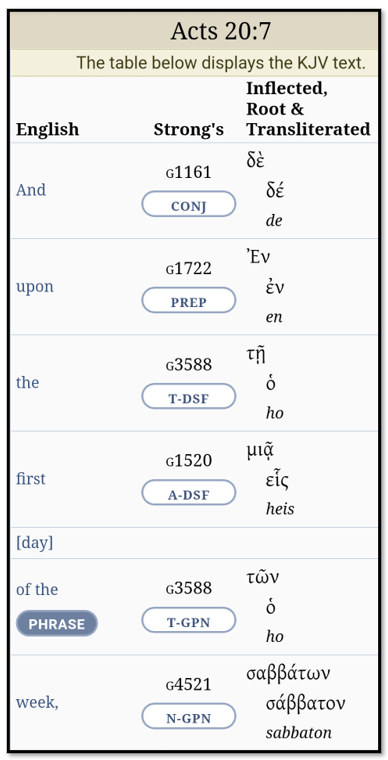 Most of the Christian world believes that the above verse, and others like it, teach us that the disciples began to steer away from Sabbath observance and began to observe Sunday (the first day of the week). But is this a true assumption?
Most of the Christian world believes that the above verse, and others like it, teach us that the disciples began to steer away from Sabbath observance and began to observe Sunday (the first day of the week). But is this a true assumption?
The Meaning of the
Phrase “First Day of the Week”
The first thing we must consider here is the fact that, if you were to look at the King James Version (KJV) of these texts, you will notice that the word “day” in the phrase “first day of the week” is in italics in EVERY instance. This was done by the translators to show that the word “day” is not in the original Greek (see left for interlinear sample).
Likewise, the word translated as “week” is the Greek word σάββατον (sabbaton) which ultimately means “Sabbath”, but can also refer to the word “week” or “weeks”, but always in the context of Hebraic thought! (See below). A good example of this is found in the book of Luke: “I fast twice in the week [sabbaton], I give tithes of all that I possess” (Luke 18:12).
The Greek phrase “first day of the week” as we know it is: πρώτη ημέρα της εβδομάδας (próti iméra tis evdomádas). However, the Greek phrase found in Scripture is: μία των σάββατον (mia ton sabbaton) which literally means: “first [day] from the Sabbath” or “the first [day] of the Weeks.” For example, the Literal Standard Version translates this phrase as "And on the first [day] of the weeks" (John 20:1, the word "day" within brackets is found in this translation). As we will see, this latter usage is clearly from an Hebraic (Hebrew) mindset and MUST be treated as such as we study this topic.
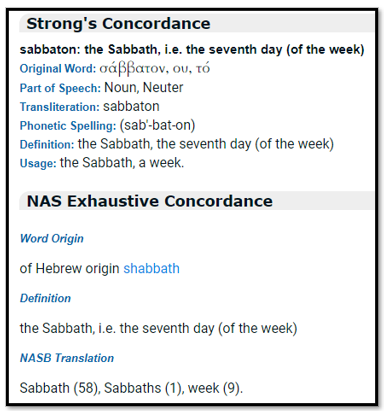 But what does the phrase “the first [day] of the Weeks” refer to? In Leviticus chapter 23 God instructs His people on what to do after the first weekly Sabbath which falls during the 7-day Festival of Unleavened Bread:
But what does the phrase “the first [day] of the Weeks” refer to? In Leviticus chapter 23 God instructs His people on what to do after the first weekly Sabbath which falls during the 7-day Festival of Unleavened Bread:
“Speak unto the children of Israel, and say unto them, When ye be come into the land which I give unto you, and shall reap the harvest thereof, then ye shall bring a sheaf of the Firstfruits of your harvest unto the priest: ... And ye shall count unto you from the morrow after the Sabbath, from the day that ye brought the sheaf of the wave offering; seven Sabbaths shall be complete: Even unto the morrow after the seventh Sabbath shall ye number fifty days; and ye shall offer a new meat offering unto the LORD.” (Leviticus 23:10, 15, 16)
Here it is again in the International Standard Version:
“Tell the Israelis that when you enter the land that I’m about to give you and gather its produce, you are to bring a sheaf from the first portion of your harvest to the priest … Starting the day after the Sabbath, count for yourselves seven weeks from the day you brought the sheaf of the wave offering. They are to be complete. Count fifty days to the day after the seventh Sabbath, then bring a new meal offering to the LORD."
Keep in mind that "the Sabbath" mentioned here is referring to "the Sabbath" which is mentioned back in verse 3, which is the weekly Sabbath. It is the only "Sabbath" mentioned so far in Leviticus chapter 23. I say "so far" because the Day of Atonement, which takes place on the 10th day of the seventh month, is the only other day considered to be a "Sabbath" (Verse 32). Even though the first and seventh day of Unleavend Bread are days when no "servile work" is to be done (verses 7-8), God never refers to them as "Sabbaths." Therefore, it is clear that the day after the first weekly Sabbath during the Feast of Unleavened Bread, God instructed His people to bring the Firsfruits (first portion) of barley to the priests to be waved before the Lord.
Passover falls on the 14th day of the first Jewish month (Nisan) correlating to March/April on the Gregorian calendar (Verse 5). The 7-day Feast of Unleavened Bread begins the day after on the 15th (Verse 6). Passover and Unleavened Bread are often combined into one Festival because the instruction not to eat leavened bread was for the day of Passover as well. When combined, they become an 8-day festival. No matter what day of the week Passover fell on during a particular year (whether it be a Tuesday or Thursday etc.), the counting of the seven weeks (Sabbaths) would not begin until Sunday, the day after the first Sabbath. For example: If Passover fell on Tuesday the 14th, the counting would not begin until the very next Sunday the 19th (the day after the Sabbath). Seven days later (counting Sunday) the following Saturday would be the first Sabbath (week), the next Sabbath would be the second Sabbath (week), the following Sabbath the third and so forth.
In Deuteronomy 16:9 this instruction to count seven Sabbaths is repeated, but the word shabu’a, which means “seven days" or "seven weeks” or even "seven years", is used instead of the word Shabbat (Sabbath(s). In this context it refers to "seven weeks."
"Seven weeks shalt thou number unto thee: begin to number the seven weeks from such time as thou beginnest to put the sickle to the corn." (Deuteronomy 16:9)
It was the time when they would count 49 days or “seven Sabbaths” or “seven weeks” from the Feast of Firstfruits (when they would wave the barley sheaf in the presence of the Lord) and then the 50th day would be the Feast of Pentecost.
The English word, Pentecost, comes from the Greek word Πεντηκοστή (pentékosté) meaning, “fifty”, but in Hebrew the Festival is called, שבועות (Shavuot) which means, “weeks.” Another name for "the Feast of Pentecost" is "the Feast of Weeks" because you calculate it by counting the seven weeks (Sabbaths).
"Seven weeks shalt thou number unto thee: begin to number the seven weeks from such time as thou beginnest to put the sickle to the corn. And thou shalt keep the feast of weeks unto the LORD thy God with a tribute of a freewill offering of thine hand, which thou shalt give unto the LORD thy God, according as the LORD thy God hath blessed thee." (Deuteronomy 16:9-10)

The meaning of the phrase “first [day] of the week” could be worded a couple of ways:
- “The first from the Sabbath” would mean, “The first [day] from [i.e., after] the Sabbath.” This would be the first day after the first weekly Sabbath after Passover—the Day of Firstfruits.
- “The first of Sabbaths/Weeks” would mean, “The first [day] of [counting] the Sabbaths/Weeks [until Shavuot/Pentecost].” Again, this would be the day after the first weekly Sabbath after Passover (the Day of Firstfruits). This is always a “Sunday”, but it is extremely important to understand that it is NOT a WEEKLY Holy day, but an ANNUAL one.
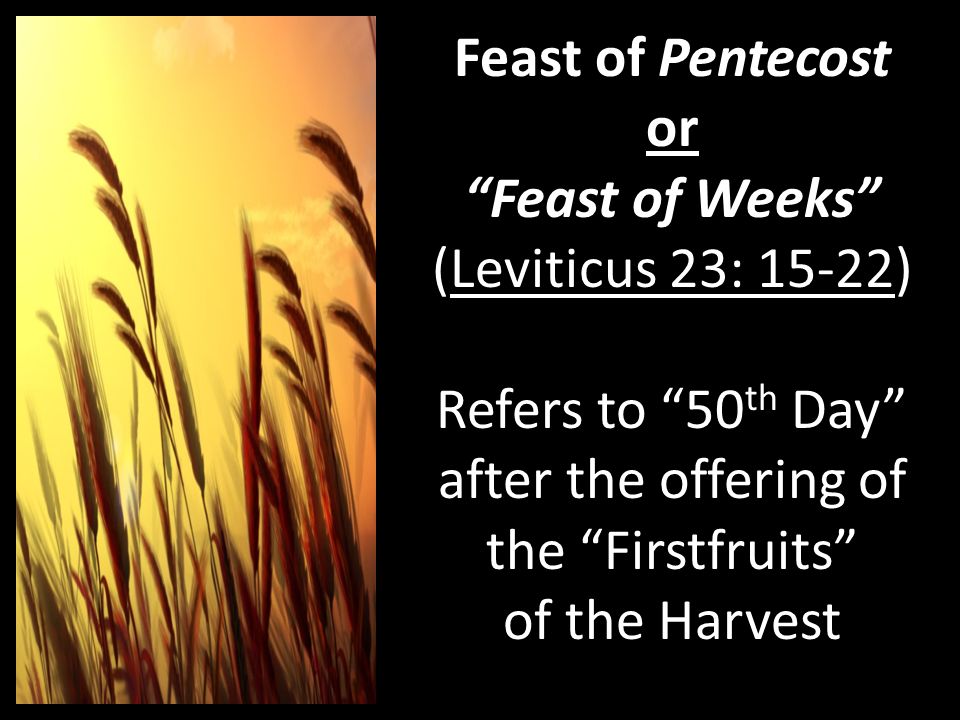 In fact, you will notice that EVERY TIME the phrase “First [day] of the week" is used, it is always surrounded by the Feast of Passover/Unleavened Bread and Pentecost. Matthew 28:1; Mark 16:1-2, 9; Luke 24:1; and John 20:1 all refer to the “first [day] of the week” because it refers to the Feast of Firtsfruits— the day Jesus rose from the grave, which was the first day after the first Sabbath had passed during the 7-8 day Feast of Passover/Unleavened Bread. The harvest of the Firstfruits barley by the priests was done after sunset at the end of the first weekly Sabbath during the Feast of Unleavened Bread and brought back to the temple. The barley was then parched, ground, and baked during the night to prepare it for the Firsftruits offering in the morning, the day after the Sabbath, when it would be publically waved to God. This is why Paul wrote:
In fact, you will notice that EVERY TIME the phrase “First [day] of the week" is used, it is always surrounded by the Feast of Passover/Unleavened Bread and Pentecost. Matthew 28:1; Mark 16:1-2, 9; Luke 24:1; and John 20:1 all refer to the “first [day] of the week” because it refers to the Feast of Firtsfruits— the day Jesus rose from the grave, which was the first day after the first Sabbath had passed during the 7-8 day Feast of Passover/Unleavened Bread. The harvest of the Firstfruits barley by the priests was done after sunset at the end of the first weekly Sabbath during the Feast of Unleavened Bread and brought back to the temple. The barley was then parched, ground, and baked during the night to prepare it for the Firsftruits offering in the morning, the day after the Sabbath, when it would be publically waved to God. This is why Paul wrote:
“But now Christ is risen from the dead, and has become the FIRSTFRUITS of those who have fallen asleep. For since by man came death, by Man [Christ] also came the resurrection of the dead. For as in Adam all die, even so in Christ all shall be made alive. But each one in his own order: Christ the FIRSFRUITS, afterward those who are Christ’s at His coming.” (1 Corinthians 15:20-23)
From this event, the 50-day count to Pentecost began.
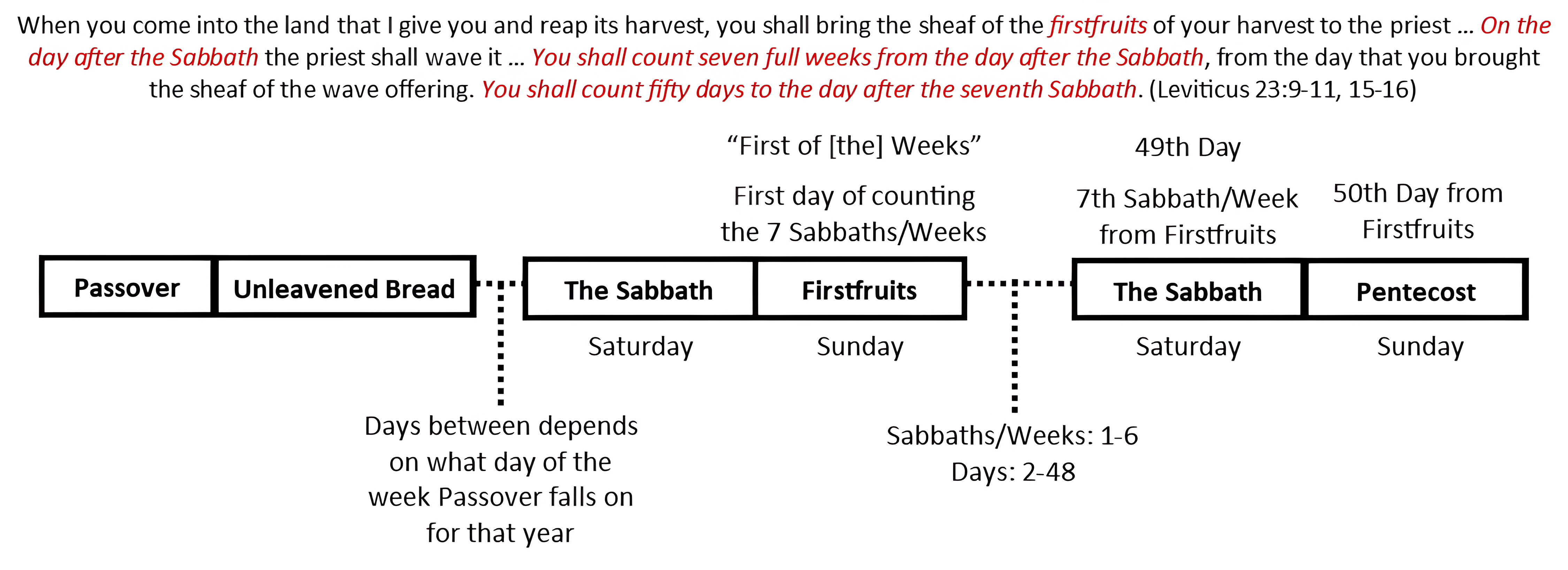
When we compare the four Gospels, we find this exact sequence surrounding the death of Jesus leading up to the Day of Pentecost.
Passover/Unleavened Bread:
Matthew 26:2, 17-19
Mark 14:1, 12-16
Luke 22:1-15
John 13:1; 18:28-39; 19:14
The Sabbath:
Matthew 28:1
Mark 16:1
Luke 23:50-56
John 19:31,38-42
First Day of the Week/Firstfruits:
Matthew 28:1
Mark 16:2, 9
Luke 24:1
John 20:1, 19
Day of Pentecost:
Acts 2:1
Before we look at Acts 20:7 in detail, let's take a look at a few of these verses in the New Testament that mention "the first [day] of the week."
John 20:19
The very evening of the day Jesus rose from the grave we read this:
"Then the same day at evening, being the first [day] of the week, when the doors were shut where the disciples were assembled for fear of the Jews, came Jesus and stood in the midst, and saith unto them, Peace be unto you.” (John 20:19)
According to Scripture, the disciples are found gathered together the evening of Jesus' resurrection. Some believe they were there celebrating and establishing a weekly Sunday worship service in honor of the resurrection. But, as you will see, this conclusion is not accurate.
The disciples could not have been gathered together in honor of Christ's resurrection because they didn't even believe He had risen at this time. After they were told that Jesus had been seen by the women, these "words seemed to them [the disciples] as idle tales, and they did not believe them" (Luke 24:9-11). After Mary told the others, Peter runs to the tomb, enters it, and sees nothing but the linen cloths. He then leaves the tomb puzzled at what happened (compare, John 20:1-10; Luke 24:12). At this point even Peter is unsure what happened to Jesus. This is why the angel told the other women, who showed up later, to also go and tell the others, “especially Peter”, because Peter is the one who entered the empty tomb and left with severe confused thoughts and emotions hours before they arrived. The angel wanted to comfort Peter (Mark 16:6-8). In Mark’s account of this he writes, “And they (the disciples), when they had heard that He (Jesus) was alive, and had been seen of her (Mary Magdalene), refused to believe her” (Mark 16:11). Later, Jesus appeared to two disciples, but when they went to tell the others they had seen Him “they didn’t believe them either” (Verses 12-13). Why didn’t the disciples believe? “For they did not yet understand the Scripture that Jesus had to rise from the dead” (John 20:9).
When Jesus appeared to those two disciples earlier that day, they did not recognize Him at first. They began to explain the events of the previous week to Him, and how Jesus of Nazareth was crucified and buried, and they were now discouraged because they had hoped He was the Messiah. Jesus speaks up and lovingly rebukes them for their lack of understanding the Scriptures which had foretold all these things, and then “beginning at Moses and all the prophets, He expounded unto them in all the Scriptures the things concerning Himself" (Luke 24:23-27). I am sure He taught all about the Passover and Firstfruits offering! Now listen to what happens next:
“As they came near the village where the two men were headed, Jesus acted as though He were going farther. But they strongly urged Him, ‘Stay with us, because it is almost evening and the daylight is nearly gone.’ So He went in to stay with them. While He was at the table with them, He took the bread, blessed it, broke it in pieces, and gave it to them. Then their eyes were opened, and they knew who He was. And He vanished from them.” (Luke 24:28-31)
After these men finally realized that Jesus had risen, they ran all the way back to Jerusalem and joined the other disciples, who were gathered together, and told them they had seen the risen Savior (Verses 33-35), but, as we have seen, "they did not believe them." This is where the verse in John 20:19 picks up the story. Teachers refer to this verse to “prove” that the disciples began to observe Sunday as a weekly holy day in honor of the resurrection in place of the 7th-day Sabbath. But remember, we have just learned that they did not believe Jesus had risen from the grave. They were already assembled together late in the evening before the two other disciples even showed up. Why would they be assembled for a worship service in honor of His resurrection if they didn’t believe that it happened?
Going back to Luke chapter 24 we read that, after Jesus reveals Himself to them inside the locked room, He asked, “why are you doubting?” (Verses 36-38). In Mark’s account of this same meeting he states that Jesus “rebuked their unbelief and hardness of heart, because they didn’t believe those who had seen Him after He was risen” (Mark 16:14). Again, they did not lock themselves in the upper room to celebrate the resurrection, they locked themselves in the room "for fear of the Jews" just as John 20:19 says. Let's read it again:
"Then the same day at evening, being the first [day] of the week, when the doors were shut where the disciples were assembled for fear of the Jews, came Jesus and stood in the midst, and saith unto them, Peace be unto you.” (John 20:19)
They were afraid the Jewish leaders were going to arrest them, thinking they had stolen the dead body of Jesus from the tomb.
John 20:26 and the Counting of the Omer
This counting of the “seven Sabbaths/Weeks” is also called “the counting of the Omer”:
“The Festival of Passover commemorates the Exodus of the Israelites from Egypt. Shortly afterwards, there is a Festival of the Firstfruits of the Barley Harvest, more commonly known as the “First Day of the Omer.” An omer is a measure of grain, and on the First Day of the Omer the priest would wave a sheaf of barley, equivalent to an omer, before the Lord. This Festival is known as “First of Weeks” in the New Testament, although it is commonly translated as “first day of the week.” It is important to understand the significance of this festival, because it is the day when Jesus rose from the dead.” (http://www.annomundi.com/bible/firstfruits)
In John 20:26 we read:
“And after eight days again His disciples were within, and Thomas with them: then came Jesus, the doors being shut, and stood in the midst, and said, Peace be unto you.”
This is “eight days” from the day Jesus rose from the grave. By counting the day Jesus first appeared to His disciples (Sunday), eight days later brings us to the following Sunday. Is this proof that Jesus and His disciples began to observe Sunday as a weekly day of public worship in place of the Sabbath? No! The Jews would count the Omer every evening after nightfall, from the day after the first weekly Sabbath after Passover. Nehemia Gordan explains:
“There are different methods of counting the 50 days. According to some the commandment 'and you shall count for yourselves fifty days' means to simply observe the 50th day as Shavuot while others actually declare out loud the number on each of the fifty days. A medieval Karaite Jewish practice combines two different methods of declaring the daily count. The first method is the counting of seven weeks. Each day, the number of the week and the number of the day in the week are declared. So for example, the first day is 'first day of the first week'. The second counting method used is an overall number for each day. In this method Day one is 'the first day' and Day 25 is 'the twenty-fifth day'. These two methods are used to satisfy the commandment to count seven weeks (Deuteronomy 16:9) as well as the commandment to count fifty days (Leviticus 23:16).” (nehemiaswall.com/counting-omer)
This meeting in John 20:26 went into the eighth night after the weekly Sabbath from Passover. During these nightly meetings they would say a blessing and proclaim, “Today is one day of the Omer”; “Today is two days of the Omer”; “Today is three days of the Omer”; etc. all the way to Pentecost/Shavuot. In John 20:26 John is simply informing us that this was day eight after Firstfruits when they would say, “Today is eight days of the Omer.”
Please note that John does not call this day "the first day of the week" (mia ton Sabbaton). He simply says it's the "eighth day." He does not say, "And after eight days, on the first day of the week ..." We today would call this "the first day of the week" (simply meaning the weekly Sunday), but John does not. Why? Because mia ton Sabbaton is NOT referring to the weekly Sunday, but to the annual day of Firstfruits which was eight days prior— or simply, "the first day of the first week."

We find a similar obscure phrase in the book of Luke:
“Now it happened on the second Sabbath after the first that He went through the grainfields.” (Luke 6:1)
The phrase “second Sabbath after the first” is (and should be) a confusing phrase to most Gentiles. We would automatically ask, “When was the first Sabbath?” This phrase is clearly Hebraic and would not confuse any Jew living at that time. The greek word for "second" here is δευτερόπρωτος (deuteroprotos). Let’s allow Strong’s Exhaustive Concordance to help us here:
“δευτερόπρωτος (deuteroprotos), means actually second-first, i.e. (specially) a designation of the Sabbath immediately after the Paschal [Passover] week (being the second after Passover day, and the first of the seven Sabbaths intervening before Pentecost): i.e., the second … after the first.”
To clarify (because it can still be confusing), “the second Sabbath after the first” is referring to the very next Sabbath after the first Sabbath following Passover. Simply put, “the second Sabbath” is the second Sabbath after Passover. Since the “first Sabbath” (which came after Passover but before Firstfruits) is not part of the counting of the seven Sabbaths towards Pentecost, this “second Sabbath” is actually the first in the count, being one week (7 days) from Firstfruits. With that said, John’s “eighth day” would be the day after this second Sabbath.
After His resurrection Jesus stayed with His disciples, preparing them to receive His Holy Spirit, for 40 days until He ascended to heaven (Acts 1:3-5). Then 10 days later, “When the day of Pentecost had fully come, all of them were together in one place [at the Temple]”, and they received the Holy Spirit in a mighty way “and began to speak in foreign languages as the Spirit gave them that ability” (see, Acts 2:1-4).
.jpg)
And don’t miss this important point: Since they were observing the Day of Pentecost (Shavuot/Weeks) in Acts chapter 2, they must have been counting (observing) the seven Sabbaths from the day Jesus rose from the grave. This would be odd if the Sabbath and Feasts were done away with at the cross! In fact, in the following two references to “the first [day] of the week”, you will see how the “Feast of Unleavened Bread” and “Pentecost” are also right in the context.
1 Corinthians 16:1-2
“Now concerning the collection for the saints, as I have given order to the churches of Galatia, even so do ye. Upon the first day of the week let every one of you lay by him in store, as God hath prospered him, that there be no gatherings when I come.”
Some point to this verse to show that the people were to bring their “collection for the saints” to church on the first day (Sunday) of every week. But do these verses really say they came together for public worship to celebrate on Sunday in place of the Sabbath? Not at all.
Paul is writing this letter to the churches throughout Asia Miner giving orders for them to collect some goods for the poor saints in Jerusalem. In the original Greek the phrase translated, “lay by him in store”, gives the notion of laying aside by the individual “by himself” (παρ᾽ ἑαυτῷ) at home. Notice these alternate translations (keep in mind we are only concerned about where they are to collect the money for now):
Weymouth’s New Testament in Modern Speech: “On the first day of every week let each of you put on one side and store up at his home whatever gain has been granted to him; so that whenever I come, there may then be no collections going on.”
Darby’s Translation of the Bible: “On [the] first of [the] week let each of you put by at home, laying up [in] whatever [degree] he may have prospered, that there may be no collections when I come.”
The Peshitta Holy Bible Translated [Aramaic Into Plain English]: “On every Sunday, let each person of you lay aside in his house and keep that which he can, so that when I come there will be no collections.”
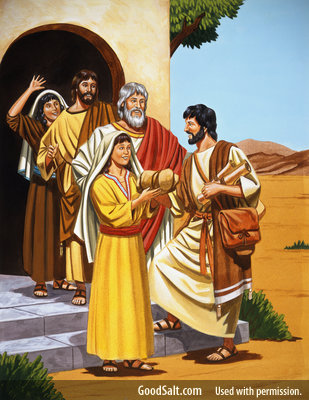 Let’s briefly discuss why a few translations will say something like “On the first day of every week.” The Greek word for “on” (or upon) is the word κατά (kä-tä'), which Strong’s Lexicon defines as “against, down from, throughout, by; acc: over against, among, daily, day-by-day, each day, according to, by way of.” Instead of “the first day of every week”, it seems more appropriate that Paul is suggesting storing up their offerings at home “daily” during or throughout or among the seven weeks leading up to Pentecost. In this sense, it could possibly be translated as “Beginning on the first [day] of Weeks let each of you put aside …”
Let’s briefly discuss why a few translations will say something like “On the first day of every week.” The Greek word for “on” (or upon) is the word κατά (kä-tä'), which Strong’s Lexicon defines as “against, down from, throughout, by; acc: over against, among, daily, day-by-day, each day, according to, by way of.” Instead of “the first day of every week”, it seems more appropriate that Paul is suggesting storing up their offerings at home “daily” during or throughout or among the seven weeks leading up to Pentecost. In this sense, it could possibly be translated as “Beginning on the first [day] of Weeks let each of you put aside …”
They would “store up” their offerings “at home” during the “seven weeks” because Paul was going to “stay in Ephesus until Pentecost” (See verses 5-8), at which time he would be at Jerusalem for the Festival.
Paul’s instructions, in 1 Corinthians 16:1-2, to store up an offering for the poor people in Jerusalem, "as God hath prospered him" or “in proportion to what God has given you”, during the “seven weeks” leading up to Pentecost, clearly shows they were celebrating the Festival of Weeks at this time according to the direct divine instruction in the Law which says:
“Every male must appear in the presence of the LORD your God three times a year at the place where He will choose: for the Festival of Unleavened Bread, the Festival of Seven Weeks, and the Festival of Booths [Tabernacles]. He must not appear in the LORD’S presence empty-handed, but each one must appear with his own gift, in proportion to the blessing that the LORD your God has given you.” (Deuteronomy 16:16-17)
In fact, prior to all of this discussion about storing up offerings, Paul also counsels them on how to properly observe Passover/Unleavened Bread:
"Your boasting is not good. Do you not know that a little leaven leavens the whole lump? Cleanse out the old leaven that you may be a new lump, as you really are unleavened. For Christ, our Passover lamb, has been sacrificed. Let us therefore celebrate the festival, not with the old leaven, the leaven of malice and evil, but with the unleavened bread of sincerity and truth." (1 Corinthians 5:6-8)
So here's the sequence of events as we see them in this first letter to the Corinthians:
Passover/Unleavened Bread:
1 Corinthians 5:6-8
First Day of the Week/Firstfruits:
1 Corinthians 16:1-2
Day of Pentecost:
1 Corinthians 16:8
.jpeg)
As an added note, this all shows that the Galatian believers also kept these Feasts including the weekly Sabbath. How? Paul gave these same instructions to begin storing up an offering during the 7 weeks to the Galatians as well. In 1 Corinthians 16:1 Paul begins by saying, “Now concerning the collection for the saints, you [Corinthians] should follow the directions I also gave to the assemblies IN GALATIA.” This clearly means, in Galatians 4:9-11, Paul is NOT speaking against the God-given Feast Days and Sabbaths as is normally taught today.1
Acts 20:7
“And upon the first day of the week, when the disciples came together to break bread, Paul preached unto them, ready to depart on the morrow; and continued his speech until midnight.”
This is probably the number 1 verse in all of Scripture that teachers use to try and prove the 1st century disciples were keeping Sunday as a sacred day by holding weekly religious services upon it. However, once again, this is simply not the case. First, notice how the Jubilee Bible translates Acts 20:6-7:
“And we sailed away from Philippi after the days of unleavened bread and came unto them to Troas in five days, where we abode seven days. And the first of the sabbaths, when the disciples came together to break bread, Paul preached unto them, ready to depart the next day, and continued his word until midnight.”
As you can see, the seven-day Feast of Unleavened Bread (8 days when you include Passover) and the Sabbath are both used together in the context. It is also most important to note that they were celebrating Passover (the days of unleavened bread) in Philippi which was populated by Greeks and Romans.2
But how can it be “the first of the Sabbaths” if they did not sail from Philippi until “after” the “days of Unleavened Bread”?
- In the Greek it is more accurately, “We sailed away from Philippi during (among, in the midst of) the Days of Unleavened Bread” because the Greek preposition μετὰ (meta) is being used with a verb of motion here. One of the definitions of μετὰ in Thayer's Greek Lexicon is: "in the midst of, amid ... among." It is used in Matthew 1:23 saying "and they shall call His name Emmanuel, which being interpreted is, God with [μετὰ] us" or "God among us" or "God in the midst of us." Mark tells us that Jesus told them, "the Son of Man (Messiah) must suffer many things, and be rejected of the elders, and of the chief priests, and scribes, and be killed, and after [μετὰ] three days I will rise again" (Mark 8:31). Here the word μετὰ means "within three days." It does not mean "after" in the sense that the third day had passed. It’s the same as saying He would rise “in (within) three days” (John 2:19). We know that after Jesus was buried, the Pharisees went to Pilate and said, "Sir, we remember that the deceiver (meaning Jesus) said, while He was yet alive, 'After [μετὰ] three days I will rise again.' Command therefore that the sepulchre be made sure until the third day, lest His disciples come by night, and steal Him away, and say unto the people, 'He is risen from the dead ...'" (Matthew 27:63-64). They clearly understood the meaning of "after three days" to mean "within" three days, or "during" a three-day period.
- The phrase at the end of Acts 20:6 saying, “we abode [in Troas] seven days”, is still referring to the seven Days of Unleavened Bread, and may be more accurately translated as, “we consumed (or 'completed') [διατρίβω] the seven days.” Strong's Concordance defines διατρίβω (diatribó) as: "to rub between, rub hard, to wear away, consume, to spend, pass time."
- The “five days” mentioned are not the length of the voyage; for it only takes two days to sail from Philippi to Troas according to Acts 16:11-12 (keeping in mind that Philippi was inland and did not require an additional day on the ship). The meaning is they arrived in Troas on the 5th day of Unleavened Bread.
So, yes, it is very probable that this meeting initially began on the first weekly Sabbath after Passover, when they would all come together for worship, and the teaching went long into the night. Believing this event happened in AD 57, Daniel Gregg writes:
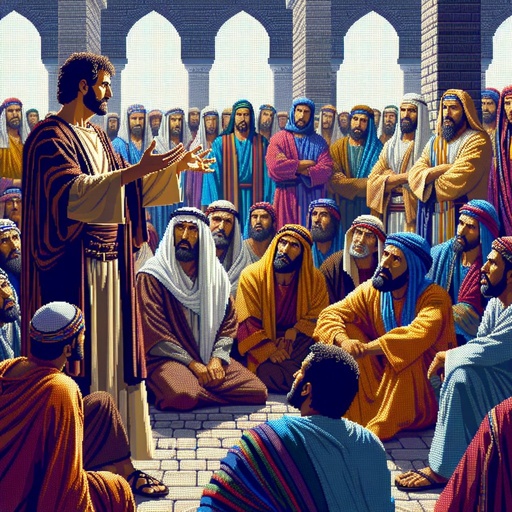
“In AD 57 the 2nd and 6th days of Unleavened Bread fell from Sunday to Thursday. They sailed sometime midweek in the midst of these days and arrived on day 5 of the feast, a Wed, and were at Troas for days 6 and 7 of the feast. Then on the first of the Sabbaths after Passover Paul met and taught all Sabbath and the following night.” (torahtimes.org)
I’d like to interject here for a moment because, as you may be able to tell from the above comment by Daniel Gregg, there are some who believe the phrase mia ton Sabbaton (First of the Sabbaths) refers to the first Sabbath after Passover and not to the first [day] of [from/after] the first Sabbath. This would mean that Christ actually rose from the grave on the Sabbath. Although I will not try to debunk that idea here, let me just respectfully say that I do not adhere to this teaching even though I am not personally against studying it. I believe it more accurately refers to “the first [day] from the Sabbath” between Passover and Pentecost, or “the first [day] of [the Feast of] Weeks.”
Continuing on in our study, Luke writes that Paul “continued his speech until midnight.” This does not mean Sunday night as we Westerners would think. In the Bible a day begins at sunset and continues to the following sunset. In the Creation account in Genesis 1 we see this by the repeated phrase, “and the evening and the morning were the first day … second day … third day” etc. The evening always comes first. This is vital to understand.
“Our convention of starting a new day at midnight is an arbitrary, humanly devised practice. God, who created the heavenly bodies and set them in motion to mark the passage of time (Gen. 1:14), counts time differently—from evening to evening. We see this indicated in the creation account in Genesis 1. After dividing day from night, God tells us that ‘the evening and the morning were the first day’ (Gen. 1:5). ‘Evening’ is mentioned first, followed by ‘morning.’ God describes each day’s creation in similar terms (Gen. 1:8; Gen. 1:13; Gen. 1:19; Gen. 1:23; Gen. 1:31). In the Bible, evening began when the sun went down (Josh. 8:29; 2 Chron. 18:34; Neh. 13:19; Mk. 1:32), and at that time a new day began. Regarding His Sabbaths, God commands that they be observed ‘from evening to evening’ (Lev. 23:32). This was the usual way at that time of calculating the beginning and ending of days (Ex. 12:18). In New Testament times, days were calculated the same way. Mark 1:32 records that, after the sun had set, marking the end of one Sabbath, crowds brought many ailing people to Jesus to be healed, having waited until after the Sabbath to come to Him.” (ucg.org/sunset-to-sunset)
“In describing how to honor one of the feast days, God instructed the Israelites, ‘From evening to evening, you shall celebrate your Sabbath’ (Leviticus 23:32). ‘Evening’ is when the sun becomes even with the horizon, what we call sunset. ‘In the evening, at the going down of the sun …’ (Deuteronomy 16:6). ‘That evening, after sunset …’ (Mark 1:32). When the Israelites returned to Jerusalem after the Babylonian captivity, Nehemiah had to teach them how to observe the Sabbath. To prevent the Israelites from carrying on their usual day-to-day business on Sabbath, Nehemiah commanded that the gates of Jerusalem be shut ‘when the evening shadows fell on the gates of Jerusalem before the Sabbath’ (Nehemiah 13:15-19).” (Emily Thomsen, sabbathtruth.com)
“The Babylonians considered a day as beginning at sunrise, while the Egyptians and Romans were the first to begin the day at midnight. Only the Hebrews observed the day as beginning at sunset and ending the next sunset: as God had declared is a day.” (Bonita M. Quesinberry, Truth Gathering, p. 227)
When Luke writes that Paul’s sermon went until midnight, he is speaking of what we would call, “Saturday night.” Notice these alternate translations:
Good News Translation: "On Saturday evening we gathered together for the fellowship meal ..."
Revised English Bible: "On the Saturday night, when we gathered for the breaking of bread ..."
New English Bible: "On the Saturday night, in our assembly for the breaking of bread ..."
According to Hebraic timing (which Luke, the author of Acts, is clearly using) “midnight” would be roughly six hours into the next day which, in this context, is the night portion of the Festival of Firstfruits when they would begin counting the Omer (the seven weekly Sabbaths) until Shavuot/Pentecost. Paul then departed at “the break of day” (Sunday morning) and did not stay for any so-called Sunday worship service.
But why did Paul stay so long Saturday night with these believers? Quite possibly because of a Jewish custom called, Motza’ei-Shabbat (also called, Havdalah). In his Jewish New Testament Commentary, David H. Stern writes:
“Motza’ei-Shabbat in Hebrew means ‘departure of the Sabbath’ and refers to Saturday night … the Greek sabbaton transliterates Hebrew Shabbat and may be translated ‘Sabbath’ or ‘week,’ depending on the context … A Saturday night meeting would fit more naturally with Jewish Shabbat observance, wherein the restful spirit of Shabbat is often preserved into Saturday evening, after the official end of Shabbat itself, which occurs after sunset when it gets dark enough to see three stars. It would be natural for Jewish believers who had rested on Shabbat with the rest of the Jewish community to assemble afterwards to celebrate their common faith in Yeshua [Jesus] the Messiah.”
This is most-likely an additional reason the disciples were assembled “after eight days” back in John 20:26. Although John doesn’t mention the time of this meeting, it very well could have been a Motza’ei-Shabbat (Saturday night) meeting at the same time they counted the 8th day of the Omer.
Still, most of the Christian teachers insist the breaking of bread in Acts 20:7 proves they were celebrating a Communion service, thus showing reverence for Sunday (the first day of the week). However, Ellicott’s Commentary for English Readers explains that the breaking of bread is “in honour of the departed Sabbath”, not Sunday, which echoes what David H. Stern said above concerning the custom of Motza’ei-Shabbat:
“It seems probable that in churches which were so largely organized on the framework of the Jewish synagogue, and contained so many Jews and proselytes who had been familiar with its usages, the Jewish mode of reckoning would still be kept, and that, as the Sabbath ended at sunset, the first day of the week would begin at sunset on what was then or soon afterwards known as Saturday. In this case, the meeting of which we read would be held on what we should call the Saturday evening, and the feast would present some analogies to the prevalent Jewish custom of eating bread and drinking wine at that time in honour of the departed Sabbath.”
So again, Paul, nor the other disciples, are observing the first day of the week as a weekly sacred day. Instead they all traveled to Assos, some by boat, but Paul walked (Acts 20:13), and in Assos Paul boarded the boat with the others. Now notice what verse 16 says: “Paul had decided to sail past Ephesus to avoid spending time in Asia, as he was in a hurry to get to Jerusalem for the day of Pentecost, if that was possible.” So here in the context of this meeting we see them observing the “Days of Unleavened Bread” and “Pentecost.” Since they were still observing these annual Festivals, they had to be observing, and counting, the weekly Sabbath!
Here, once again is the sequence of events:
Passover/Unleavened Bread:
Acts 20:6
First Day of the Week/Firstfruits:
Acts 20:7
Day of Pentecost:
Acts 20:16
.jpeg)
“The Bible commandment says on the seventh day thou shalt rest. That is Saturday. Nowhere in the Bible is it laid down that worship should be done on Sunday.” (Philip Carrington, Episcopalian, Toronto Daily Star, Oct. 26, 1949)
“There was and is a commandment to keep holy the Sabbath day, but that Sabbath day was not Sunday ... It will be said, however, and with some show of triumph, that the Sabbath was transferred from the seventh to the first day of the week ... Where can the record of such a transaction be found? Not in the New Testament - absolutely not. There is no scriptural evidence of the change of the Sabbath institution from the seventh to the first day of the week.” (Edward Hiscox, author of The Baptist Manual, New York ministers’ conference, Nov. 13, 1893)
“Nowhere in the Bible do we find that Christ or the apostles ordered that the Sabbath be changed from Saturday to Sunday. We have the commandment of God given to Moses to keep holy the Sabbath day, that is the seventh day of the week, Saturday. Today most Christians keep Sunday because it has been revealed to us by the church outside the Bible.” (Catholic Virginian, Oct. 3, 1947)
“And where are we told in Scripture that we are to keep the first day at all? We are commanded to keep the seventh; but we are nowhere commanded to keep the first day.” (Isaac Williams, Anglican, Plain Sermons on the Catechism, pp. 334,336)
“The current notion that Christ and His apostles authoritatively substituted the first day for the seventh, is absolutely without any authority in the New Testament.” (Dr. Lyman Abbott, Congregationalist, Christian Union, June 26, 1890)
1 For more information on Galatians 4:9-11 see the article entitled: Doesn’t Paul Warn Christians Not to Observe the Old “Jewish” Holy Days?
2 For more information on whether or not Gentiles continued to keep the Festivals and Sabbaths see the article entitled: Wasn’t the Sabbath Only for the Israelites and Their Descendants Who Came Out Of Egypt?

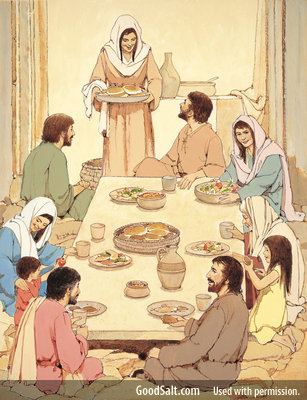
.png)
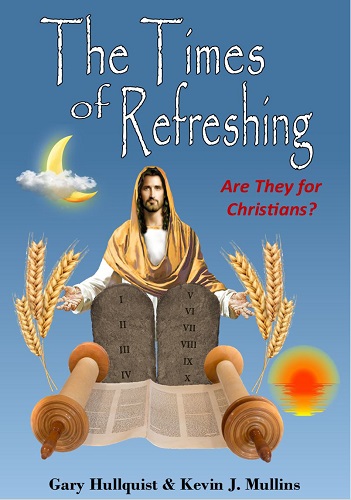


/Did_God_Kill_Jesus_(cover).jpg)
